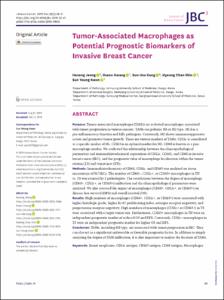Tumor-Associated Macrophages as Potential Prognostic Biomarkers of Invasive Breast Cancer
- Keimyung Author(s)
- Hwang, Il Seon; Kang, Sun Hee; Kwon, Sun Young
- Journal Title
- Journal of Breast Cancer
- Issued Date
- 2019
- Volume
- 22
- Issue
- 1
- Abstract
- Purpose:
Tumor-associated macrophages (TAMs) are activated macrophages associated with tumor progression in various cancers. TAMs can polarize M1 or M2 type. M1 has a pro-inflammatory function and kills pathogens. Conversely, M2 shows immunosuppressive action and promotes tumor growth. There are various markers of TAMs. CD11c is considered as a specific marker of M1. CD163 is an optimal marker for M2. CD68 is known as a pan-macrophage marker. We evaluated the relationship between the clinicopathological parameters and immunohistochemical expressions of CD11c, CD163, and CD68 in invasive breast cancer (IBC), and the prognostic value of macrophage localization within the tumor stroma (TS) and tumor nest (TN).
Methods:
Immunohistochemistry of CD68, CD11c, and CD163 was analyzed on tissue microarrays of 367 IBCs. The number of CD68+, CD11c+, or CD163+ macrophages in TN vs. TS was counted by 2 pathologists. The correlations between the degree of macrophage (CD68+, CD11c+, or CD163+) infiltration and the clinicopathological parameters were analyzed. We also assessed the impact of macrophages (CD68+, CD11c+, or CD163+) on disease free survival (DFS) and overall survival (OS).
Results:
High numbers of macrophages (CD68+, CD11c+, or CD163+) were associated with higher histologic grade, higher Ki-67 proliferating index, estrogen receptor negativity, and progesterone receptor negativity. High numbers of macrophages (CD11c+ or CD163+) in TS were associated with a larger tumor size. Furthermore, CD163+ macrophages in TN were an independent prognostic marker of reduced OS and DFS. Conversely, CD11c+ macrophages in TS were an independent prognostic marker for higher OS and DFS.
Conclusion:
TAMs, including M2 type, are associated with tumor progression in IBC. They can also act as a significant unfavorable or favorable prognostic factor. In addition to simply analyzing the degree of TAM infiltration, it is also important to analyze the location of TAMs.
- Publisher
- School of Medicine (의과대학)
- Citation
- Hasong Jeong et al. (2019). Tumor-Associated Macrophages as Potential Prognostic Biomarkers of Invasive Breast Cancer. Journal of Breast Cancer, 22(1), 38–51. doi: 10.4048/jbc.2019.22.e5
- Type
- Article
- ISSN
- 2092-9900
- Source
- https://ejbc.kr/search.php?where=aview&id=10.4048/jbc.2019.22.e5&code=0096JBC&vmode=FULL
- Appears in Collections:
- 1. School of Medicine (의과대학) > Dept. of Pathology (병리학)
1. School of Medicine (의과대학) > Dept. of Surgery (외과학)
- 파일 목록
-
-
Download
 oak-2019-0223.pdf
기타 데이터 / 2.29 MB / Adobe PDF
oak-2019-0223.pdf
기타 데이터 / 2.29 MB / Adobe PDF
-
Items in Repository are protected by copyright, with all rights reserved, unless otherwise indicated.